The mask has become one of the oldest forms of expression ever created by human civilization. In most societies of the world, masks play an important role in the various sides of life that hold magical and sacred values. in Indonesia , masks have existed since prehistoric times. It widely used in mask dance that became the part of traditional ceremonies or retelling ancient stories of the ancestors.
In some tribes, masks still adorn the various activities of art and custom everyday. Some masks in Indonesia are also used as decoration inside the house or outside the home. More than those functions, masks also used in some cultural activities. Here are the use of masks in Indonesian Culture.
- Si Gale-Gale Performance
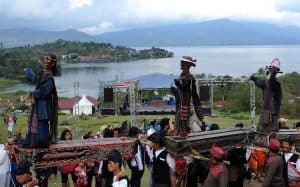 In Tapanuli, the mask performance is also used in folklore about the king and the queen’s story’s because of the death of their beloved son. Here, the mask figure consists of a pair of woman and man.
In Tapanuli, the mask performance is also used in folklore about the king and the queen’s story’s because of the death of their beloved son. Here, the mask figure consists of a pair of woman and man.
The size of the mask is just enough to cover the face. Used in dance form with tetabuhan without any special dialog. Tetabuhan is almost the same with Gamelan that come from Tapanuli.
It is called si Gale-gale, which means gentle is a wooden man-shaped statue of a man, a teenager in a near-natural size, equipped with traditional Batak costumes. Each part of his body is given joints and ropes so that a person (dalang) with a “drum” accompaniment can play it for the movements of a young man who seems to be alive.
- Gundala-Gundala
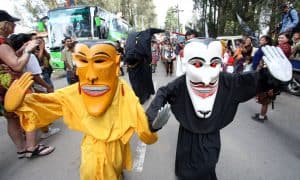 Stay at Batak tribe, traditional mask, still used by many people in some Karo villages: Sukanalu, Juma Padang, Guru Singa, Siberaya, Kubu Calia and Lingga.
Stay at Batak tribe, traditional mask, still used by many people in some Karo villages: Sukanalu, Juma Padang, Guru Singa, Siberaya, Kubu Calia and Lingga.
In Karo, the masks performance is shown on national holidays in addition to traditional ceremonies and educational folk spectacles. Functioned for the rejection ceremony, sowing seeds, and welcoming the great guests, it is performed in a comedy style without any dialogue.
The player consists of five people who act as: king / commander, consort, princess, son-in-law, and enemy (genda-gendi bird).
Read also:
- Topeng Cirebon Dance
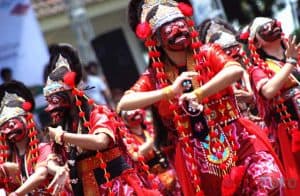 Topeng means masks in Indonesian language. Topeng Cirebon dance is one of the traditional dances that developed in Sundanese area of West Java covering the area of Ciamis, Tasikmalaya, Garut, Sumedang, Cimahi, Bandung, and Cianjur).
Topeng means masks in Indonesian language. Topeng Cirebon dance is one of the traditional dances that developed in Sundanese area of West Java covering the area of Ciamis, Tasikmalaya, Garut, Sumedang, Cimahi, Bandung, and Cianjur).
According to the growing folklore, Topeng Dance created by the sultan Cirebon is quite famous, namely Sunan Gunung Jati. Cirebon Topeng dance can be classified into five different principal mask characters, namely: Panji, Samba, Rumyang, Tumenggung, and Kelana masks. Each mask has their own characteristics that give some useful values.
- Topeng Dance from Betawi
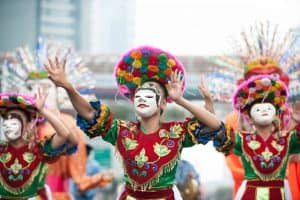 Topeng dance from Betawi, the gesture that used is lively and cheerful. Usually, this dance is accompanied by traditional music instruments such as rebab, kromong tiga, big drum, kulanter, kempul, kecrek and gong buyung.
Topeng dance from Betawi, the gesture that used is lively and cheerful. Usually, this dance is accompanied by traditional music instruments such as rebab, kromong tiga, big drum, kulanter, kempul, kecrek and gong buyung.
Because this dance is theatrical and has the element of communication through motion, commonly Betawi Topeng Dance has a big theme in every show. The theme that used is the social criticism of poverty in the colonial period. Sometimes it only presents jokes. (Read also: Things to Learn in Jakarta)
- Reog Ponorogo
 Tiger Mask and Peacock Feather sounds familiar to you. Yap, it is well known as “Reog Ponorogo”. This art is also one of the cultural arts of Indonesia that recognized by UNESCO internationally.
Tiger Mask and Peacock Feather sounds familiar to you. Yap, it is well known as “Reog Ponorogo”. This art is also one of the cultural arts of Indonesia that recognized by UNESCO internationally.
Reog is one of the cultural arts originating from East Java to the north-west and Ponorogo is considered as the real home town of Reog. Ponorogo city gate adorned by figures Warok and Gemblak, two figures who appeared any time reog performed.
Reog is one of the regional cultures in Indonesia with mystical and strong psychotherapy. Some figures in Reog Ponorogo such as Barongan, Bujang Ganong, and Klono Sewandono would use the firm mask that has strong characteristics. (Read also: Reog Ponorogo Dance)
- Hudoq Dances
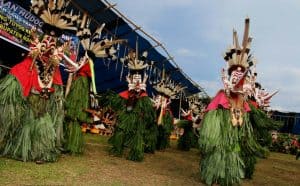 Hudoq dance is a traditional dance of eastern Kalimantan that uses a mask that copied from some figures such as animal, ancestors and gods. This dance is usually performed at the opening of farmland or after planting rice in the field.
Hudoq dance is a traditional dance of eastern Kalimantan that uses a mask that copied from some figures such as animal, ancestors and gods. This dance is usually performed at the opening of farmland or after planting rice in the field.
According to the beliefs of the people, especially the Dayak people, this dance is a ritual petition to God to give the abundant result for their agricultural.
The dancers wear the mask as the embodiment of animals or pests that are considered damaging plants such as, rats, crows, monkeys, pigs and others. In addition there is also a mask that symbolizes the eagle is regarded to protect and maintain the harvest of Dayak people. There is also a human mask symbolize as the ancestors.
- Topeng Bali
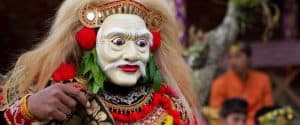 Topeng Bali dance is the drama session from traditional Balinese dance. Besides performed as an entertainment show, there is also a kind of Topeng dance to complement the religious ceremonies.
Topeng Bali dance is the drama session from traditional Balinese dance. Besides performed as an entertainment show, there is also a kind of Topeng dance to complement the religious ceremonies.
The mask that is used is one of types of Balinese masks. One of the Topeng dance that has a function in both terms is the Topeng Tua dance, also called Werda Lumaku dance. Topeng tari tua features a dancer in a magnificent fashion and wearing a wooden mask of ylang-ylang wood. From the outlook, it could be seen that the character roles as an old man.
Read also:
- Wayang Wong Yogyakarta
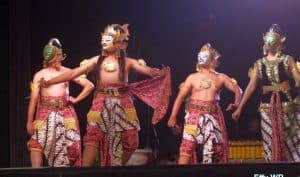 Wayang Wong is the performance of wayang which roled by some humans using the story of Ramayana or Mahabarata. It is created by Hamengku Bhuwono I (1755-1792, some of wayang characters for the role of apes and giants are equipped with mask usage, whereas for satria and female figures don’t wear any masks.
Wayang Wong is the performance of wayang which roled by some humans using the story of Ramayana or Mahabarata. It is created by Hamengku Bhuwono I (1755-1792, some of wayang characters for the role of apes and giants are equipped with mask usage, whereas for satria and female figures don’t wear any masks.
In Gedog punakawan, the role of Pentul and Tembem wear half face mask, so they can have dialog freely without lifting mask. While in Panji story, the players wear mask by stretching it. So the players can pronounce the dialog well.
- The use of Madura Mask
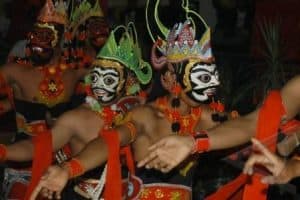 Madura mask consists of two types, the first size of the palm of the hand, and the second is larger. This form of mask does not completely cover the face of dancers, especially the chin, so that the movement of the chin can’t be hidden, but it actually gives its own aesthetic effect. This kind of mask usually used in Dalang Topeng Dance.
Madura mask consists of two types, the first size of the palm of the hand, and the second is larger. This form of mask does not completely cover the face of dancers, especially the chin, so that the movement of the chin can’t be hidden, but it actually gives its own aesthetic effect. This kind of mask usually used in Dalang Topeng Dance.
The description of the characters on the mask that used in Topeng Dalang dance could be seen on the face shape and the look of the color selection. White color for the kind character, the red color for calm and loving characters, black for wise and clean wisdom of the worldly passions (such as the puppet character of Krisna).
Read also:
- Topeng Malang
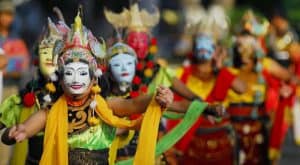 Topeng Malang is the art of dance from Malang, East Java. Topeng Malangan Dance is very unique because it is the result of a combination between the Central Java culture, West Java and East Java (Blambangan and Osing).
Topeng Malang is the art of dance from Malang, East Java. Topeng Malangan Dance is very unique because it is the result of a combination between the Central Java culture, West Java and East Java (Blambangan and Osing).
Basically, the dance gestures movements contain the elements of dynamic wealth and music from ethnic Javanese, Madura, and Balinese. Topeng Malangan dance is a cultural tourism in that estimated to appear in the early 20th century, then widespread during the war of independence.
The Topeng Malangan dance is a symbol for human nature. That is why many mask models depict different situations, such as crying, laughing, sad, embarrassed, and so on.
Those are the main use of masks in Indonesia. Besides containing the art value, masks also has some cultural function that you haven’t known before. If you visit Indonesia, you could bring them as a souvenir that would decorate your house beautifully.
